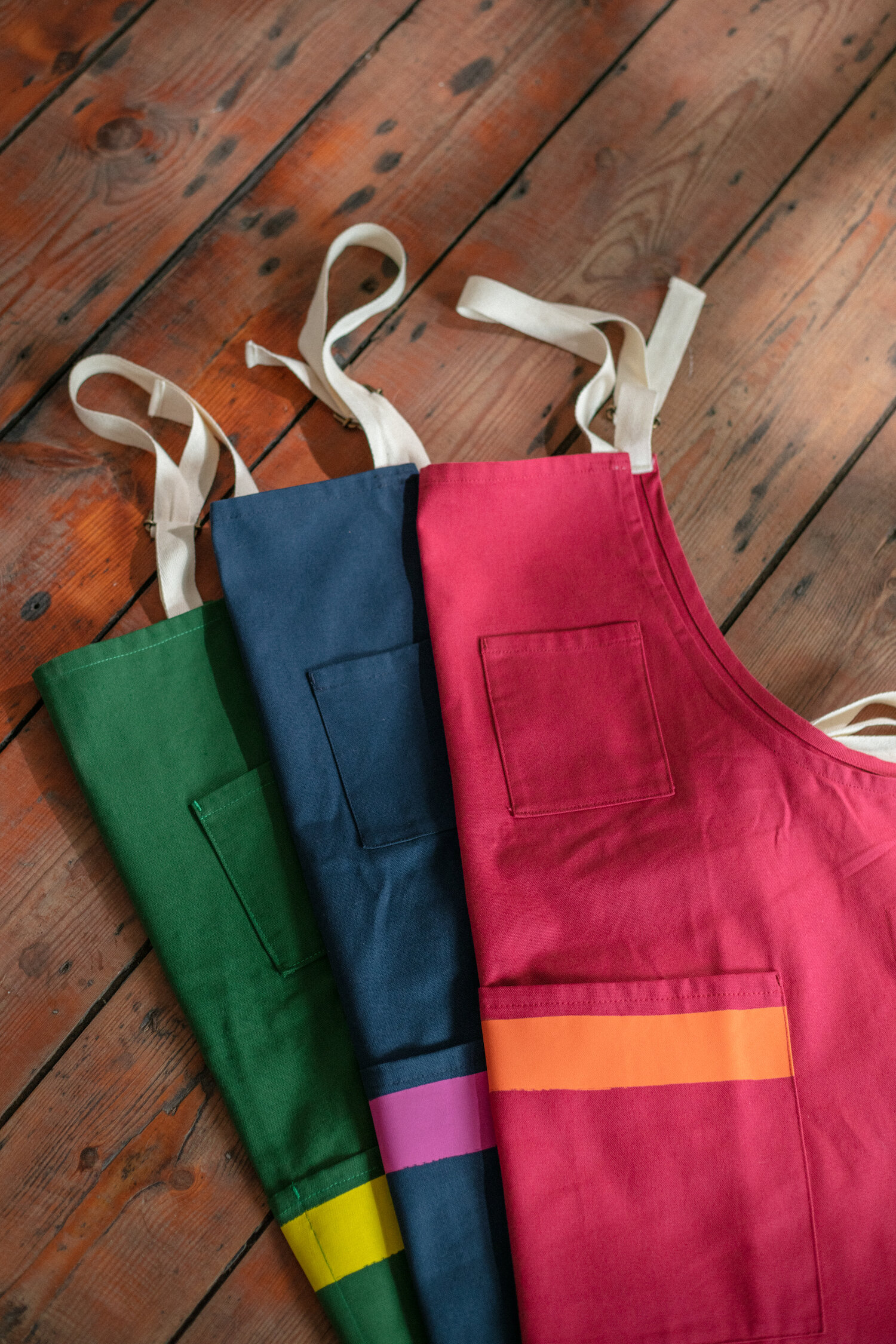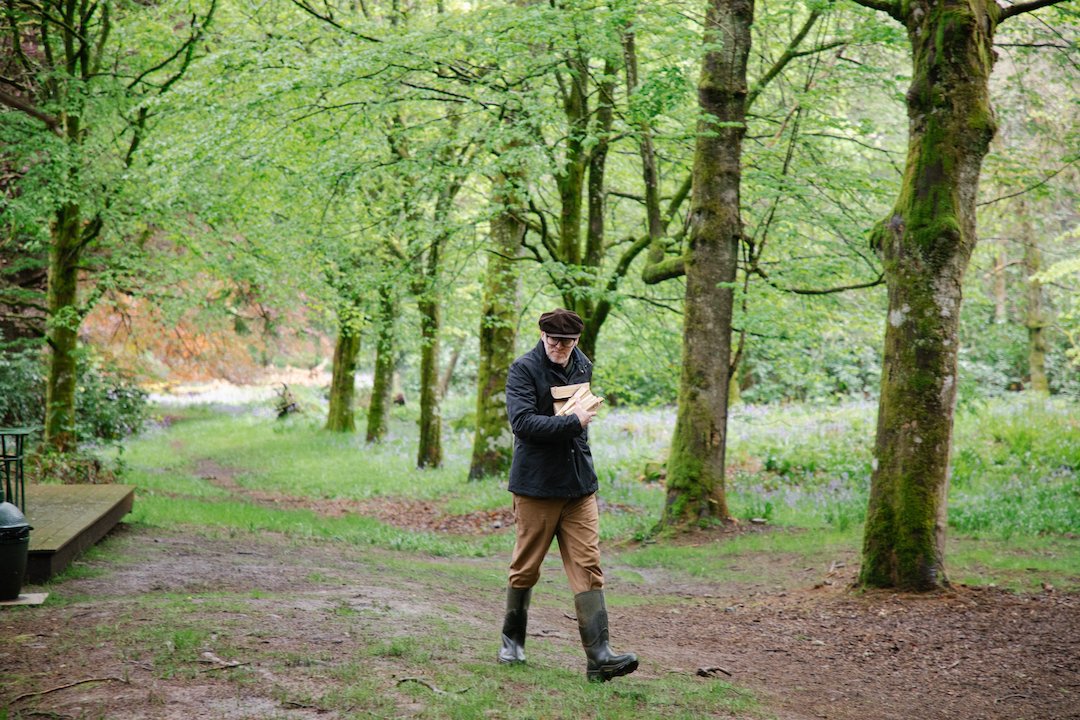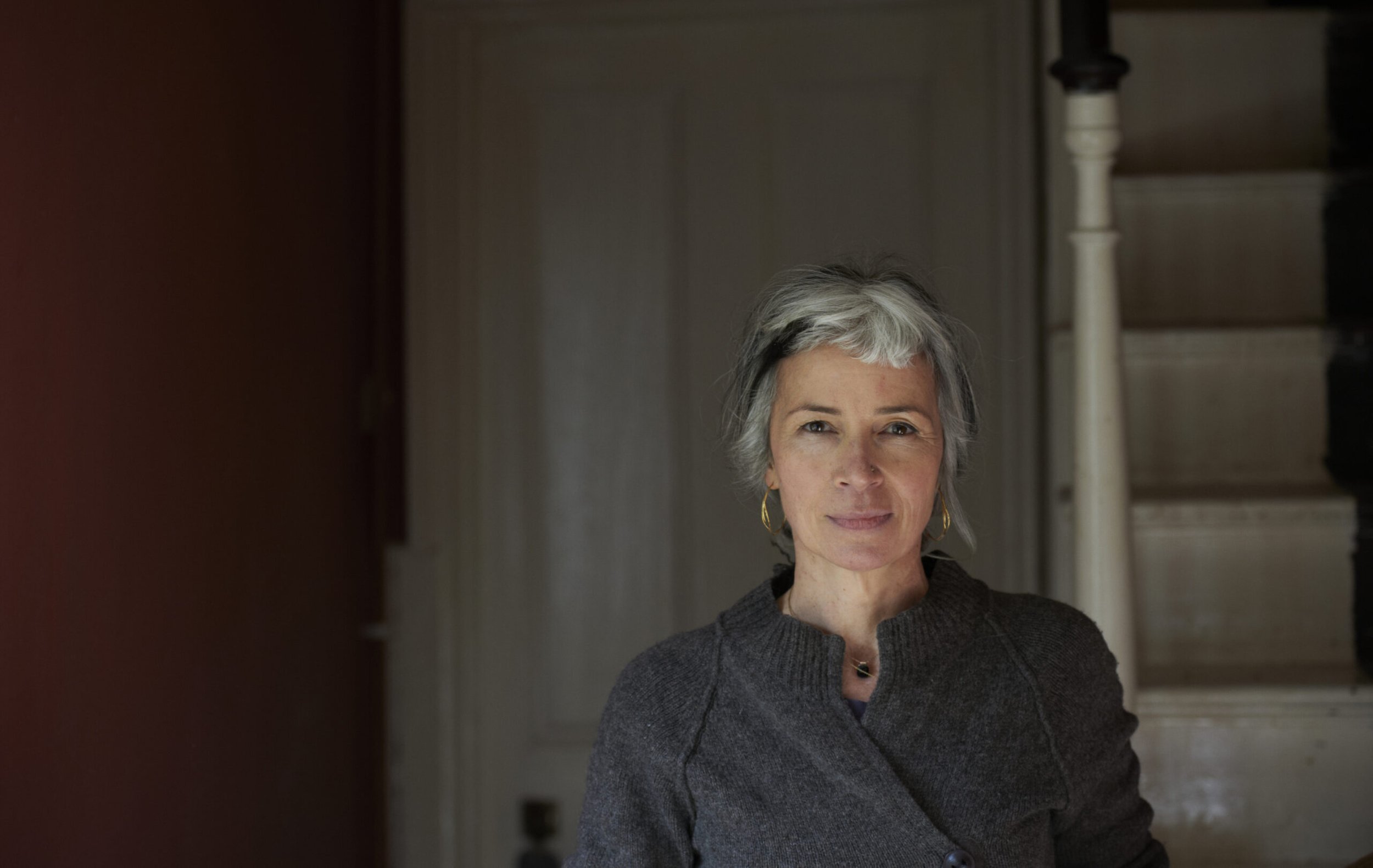From Fallujah to Farming Lavender
Image: Nancy DurhamBefore Nancy Durham became the owner of Wales' first lavender farm, she was an international journalist. Juxtaposed to the calming and soothing properties of lavender, in this fascinating story Nancy writes about a journalistic assignment that took her to war in Fallujah, Iraq in 2004.
Written by Nancy DurhamIn August 2004, I was on assignment in Fallujah, Iraq for CBS News and the History Channel. The brief was an unusual one for me. I would interview United States Marines from generals to grunts and ask them about the battle of Fallujah the previous year. I was to ask only non-confrontational questions. Straightforward things like what happened at the bridge, what next, then what, then what…Apparently sceptical, inquisitive journalists weren’t always welcome. Each time I was introduced around the sprawling camp I was given a pass with “don’t worry, she’s with the History Channel.”
When I was asked to go to Iraq, I was excited. It would be a new challenge to step into this perilous and unpredictable type of war zone and I wanted to experience it. I reflected on the conflict zones where I’d worked before; I covered the Balkans throughout the nineties from almost every corner but by focusing on civilians’ stories, I was almost always away from the shifting frontlines of war.
Iraq would be very different and I keenly wanted to see this torn country even if it would be through the eyes of US Marines. I talked with journalists who’d been there, security people who knew the territory and the ex SAS officer who’d given me my hostile environment training before my Balkans reporting.
They all said the same thing: Iraq had been relatively quiet recently and if things did kick off the Marines would have all the weapons, so I’d be protected. They also made me aware that the Marines are loathed there. In Iraq, to many, they are the enemy. It was slightly unnerving, so I asked for more money than I thought the company would pay. They readily agreed and offered me the job. I would spend 10 days in Iraq.
Image: Nancy DurhamSo there I was, buckled into my canvas side seat 200 feet above the steaming sands of Iraq in the middle of the night in a helicopter flying without lights to avoid fire. Close beside me stood a gunner with his weapon pointing out a large open window and just like that he started shooting, tat tat tat. Somehow the sound of the engine and the blades spinning, pounding in my ears, was so overwhelmingly distracting I was only mildly terrified by this new sound. It was certainly surreal. Later, I was told the gunner had been returning fire. After a short flight, we landed in a swirl of sand in the desert at Fallujah.
“If you’re up high, snipers see you coming. If you’re down low, by the time they hear you you’re on your way.”
Nancy DurhamRemarkably, after all the permissions I had acquired to be allowed on the base, no one appeared to be expecting me. Someone showed me to a huge barn like tent filled with empty bunk beds and told me to sleep there. The next morning, I wandered around to try to connect with someone who could give me the drill. Where would I find my interviewees for a start? Where were the showers, the canteen and where would I stay? Surely not in this cavernous isolated tent built to accommodate perhaps 20 people.
I found the press tent, set up next door to another tent with a howling soldier inside, out of sight, swearing and begging to be sent home. I was told his leave had been cancelled.
Diary
The day was full walking the concrete ziggy paths of the base, and in the evening right out to the edge, past the berm (new word – a sandbank perimeter) for my interview with a tank man…I was overwhelmed with the day’s words, heat and patriotism and wasn’t able to focus on him well. After we finished he talked further about the killing his tank can do. He was excited and told me he’d killed lots at Fallujah. He gives the orders, inside the tank, for the kill. I asked him how he handled that. He told me it’s like a game because you’re separated from the target.
On my second night, at four in the morning still in the big tent, I was joined by a new arrival, a female US Army soldier stopping over on her way to somewhere else in Iraq. She settled in, I tossed and turned and next thing I knew – bang.
Diary
Mortar [bomb] 300-400 yards from my tent. Crackingly loud, very, very heavy sounding. Terrifying. The soldier told me to put on my flak which I did, over my pjs.
“Helmet?”
“You don’t have to as long as you have it near you.”
I’m scared. I stood under the starry sky for a minute. A marine passed by and asked me if I was ok. They have personnel on the way over”, he said. Don’t think anyone was hurt.
Incoming mortar bombs continued randomly day and night. I recall telling a young marine about the ones I’d been near. In his strong southern drawl he answered. “Ma’am when your time comes your time comes”. Another one told me “don’t worry, they can’t aim”. None of this was reassuring.
Diary
The influx into my room continues. There are now 5 army drivers, women, bunking in. They’ll sleep all day & leave tonight. With the mortars coming in, I’d rather they stay.
CBS had given me a satellite phone to call home. What a luxury this was. However, when I learned that being on a satellite phone could put me in the sites of an insurgent, I shortened my conversations with my husband Bill, back in Wales, at home on our farm. I tried to hide my concern when we talked but he’d also heard of increased activity around Fallujah and knew me well enough to know I’d be worried. He told me he’d been doing some research and was confident my chances of being hit by something were very low. Now I could tell he was nervous. We told each other it would be all right.
Image: Nancy DurhamDiary
The army women have decamped, the short, round one aghast I was here alone. She doesn’t trust the men, army or marine & says there’ve been two rapes at her camp. So here I am, wanting sleep, about to tuck in for the night in this vast tent with fluorescent lighting, just me, and a whole empty barn, much bigger than this on the other side of a flimsy partition between it and me. No lock on the door.
The women’s washroom was called Female Head. In the 40-plus degree heat, I’d walk slowly and lethargically to it then step into the icy air produced by giant machines humming and rattling across the desert camp. I loved the signs inside “Women! Take a navy shower. Wet down, soap up, rinse off. Save water!” On my third day at camp, I met Lieutenant Colonel Lori Reynolds as we brushed our teeth. She was appalled to learn where I was staying and insisted on sharing her room with me, a concrete bunker-like building and she had an extra bed. She said prayers before eating meals and was politically very much to the right. It felt like we had nothing in common but that didn’t matter. I adored her. She was interested in the wider world and she looked after me. She asked me about Britain’s royal family. I asked her about the Marines.
“The great war correspondent Martha Gellhorn said we should write as well as we know how, and as truthfully about what we see and learn. In Iraq, I struggled. It was hard to comprehend what I saw and heard.”
Nancy DurhamOver my stay I talked to many Marines – generals, colonels, captains, sergeants. They were wary of Fallujah. Insurgents were on the rise. It didn’t feel like there would be winners here.
They taught me Marine lingo – aeroplanes and helicopters are always birds and helos. They greeted each other – and me – with “rah”. Once I got an “oorah” out of Gunny, as all gunnery sergeants seem to be called when I gave him magazines and fudge I’d brought from London. Oorah is used as a battle cry or just to show enthusiasm for something. I ate army food and heard the word kill a lot. Kill, killed, killing. I respected the officers for not using euphemisms.
The great war correspondent Martha Gellhorn said we should write as well as we know how, and as truthfully about what we see and learn. In Iraq, I struggled. It was hard to comprehend what I saw and heard.
Diary
The way the men I have met have talked about killing has shocked me in so far as they don’t back away from it. The word, or the act…I was taken into a dug out on the howitzer range and introduced, one by one, to the variety of bombs they have to choose from. The phosphorous one is in a pretty pale turquoise container. “I’d hate to have that one fired at me ma’am”, a Marine told me…The men who go out by stealth with silent weapons for the kill are taken to be brave heroes. But they are judge and jury too in whosoever they decide to kill. Fallujah has become the magnet for terrorism since the Marines were called off the job of cleansing the town of its “terrorists”… many of those who try to rule there now come to face off and taunt the Americans, and taunt them they do with daily and nightly rounds of mortars and rocket fire.
When it was time for me to leave, Lieutenant Col Reynolds sent a team to get me safely onto the helicopter for my flight from Camp Fallujah. I made it, in the dead of night as it was on my arrival, sand blowing everywhere as the helicopter blades whirred into action to take me to an airbase at Ramadi. Then it was onto one of those mammoth C130 Hercules military transport planes for my flight out of Iraq.
Diary
The pilot let me sit in a jump seat in the cockpit from where I could see Najaf, Nasiriyah and Basra. I had the most stunning views of the range of desert shades, contours, empty space and patchwork quilt shapes – mostly beige like the pilots’ jumpsuits with some dots of green…
While I waited at Doha airport for my flight to London I wrote a letter to my family telling them,
“All in all my assignment was a ripping fantastic terrifying fun adventure for this bird. It may have knocked the war lust out of me.”
And I think it did. I was going home to Wales. My first field of lavender was nearly one year old.
Image: Nancy Durham






















